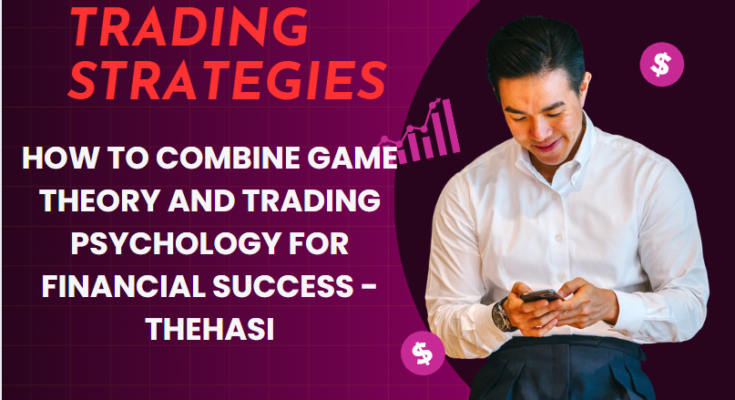Trading in the financial markets is often compared to playing a game—one where the stakes are high, and success isn’t just about following trends but anticipating movements, analyzing data, and making well-thought-out decisions. While this requires strong analytical skills, it also involves understanding the psychological aspects of decision-making. One powerful way to level up your trading game is by combining game theory and trading psychology—two essential concepts that, when used together, can improve your ability to make smarter, more strategic decisions in the market.
This article will explore how game theory and trading psychology work hand-in-hand and how you can use both to enhance your trading strategy and boost your financial success.
1. What is Game Theory in Trading?
Game theory is a mathematical framework used to analyze situations where the outcomes depend on the actions of multiple decision-makers, or “players.” In trading, this concept applies to understanding how other traders and market participants are likely to act based on certain conditions, and then making decisions that will optimize your own position.
Here’s how game theory connects with trading:
- Strategic Interaction: Just like in a competitive game, your decisions in trading often depend on what others are doing. Game theory helps you predict the behavior of other traders and make decisions that are best suited to the situation. For instance, when there’s a price movement, you have to anticipate how others will react, and base your trade accordingly.
- Nash Equilibrium: This concept from game theory suggests that in a strategic setting, players reach an equilibrium where no one can improve their outcome by changing their strategy, assuming everyone else’s strategy remains constant. In trading, this can be related to finding an optimal strategy where you no longer need to adjust your approach unless market conditions change.
By integrating game theory into your trading, you can begin to think several steps ahead and anticipate moves, just like a chess player planning their next move.
2. What is Trading Psychology?
While game theory focuses on strategy, trading psychology deals with the mental and emotional factors that influence decision-making in trading. Every trader experiences emotions like fear, greed, and overconfidence at some point, and these emotions can lead to impulsive, irrational decisions.
Here are some common psychological factors that affect traders:
- Fear of Loss: The fear of losing money can make traders close their positions too early, preventing them from reaping potential profits.
- Greed: Greed can cause traders to hold onto their positions for too long, hoping for more significant gains, even when it’s time to exit.
- Overconfidence: After a winning streak, some traders become overconfident, taking bigger risks than they should, which can lead to greater losses.
- Impatience: Sometimes, the need for instant gratification can lead traders to make hasty decisions that don’t align with their long-term strategy.
Trading psychology teaches you to understand and manage your emotional triggers. It’s not about eliminating emotions entirely, but rather about controlling them so that they don’t negatively impact your trading decisions.
3. How Game Theory and Trading Psychology Work Together
So how do these two concepts—game theory and trading psychology—complement each other? The key is understanding that both strategic thinking and emotional control are crucial for successful trading.
A. Strategic Decision Making vs. Emotional Impulses
In game theory, the focus is on making decisions based on logic, anticipating the reactions of others, and calculating the potential outcomes. Trading psychology, on the other hand, focuses on the emotional factors that might interfere with those decisions. Often, emotions like fear and greed cloud judgment and lead to decisions that go against the rational analysis provided by game theory.
For example, let’s say the market is volatile. According to game theory, this could be a time to take advantage of price fluctuations by buying when others are selling. However, fear may cause you to exit the market prematurely. In such cases, trading psychology helps you manage that fear, so you can stick to your strategy rather than act impulsively.
B. Predicting Market Behavior with Emotional Awareness
Game theory provides a framework to anticipate the decisions of other traders, while trading psychology helps you understand how your own emotions might influence those predictions.
- Predicting Market Moves: If you know that most traders might panic when the market dips (due to fear), you can use game theory to anticipate that reaction and act strategically by buying at lower prices.
- Psychological Resilience: Trading psychology helps you to manage your emotional response during such times. Even if others are panicking, your awareness of trading psychology helps you stay calm, make rational decisions, and not get swept up by the herd mentality.
When you combine the strategic insights of game theory with the emotional control from trading psychology, you can make more informed and rational decisions, even in high-pressure situations.
C. Managing Risk through Game Theory and Psychological Discipline
Both game theory and trading psychology emphasize the importance of risk management, but they approach it from different angles. Game theory encourages strategic risk-taking based on probability and the behavior of others, while trading psychology helps you avoid risky behavior driven by emotion.
For example, game theory might suggest that you can take a calculated risk based on market trends and the behavior of other traders. Trading psychology ensures that you don’t allow emotions like overconfidence or fear to drive you into taking excessive risks.
Effective risk management is about combining these two aspects: using game theory to evaluate potential outcomes and using psychological discipline to avoid emotional decision-making that could lead to unnecessary risk-taking.
4. Practical Ways to Combine Game Theory and Trading Psychology
Now that we know how game theory and trading psychology work together, let’s look at how you can apply these concepts in your own trading practice.
Step 1: Develop a Strategic Plan Based on Game Theory
Start by building a comprehensive trading plan. This should include your risk tolerance, target profits, and the strategies you plan to use in different market conditions. Game theory will help you anticipate the moves of other traders and predict potential market shifts.
Here’s how to do it:
- Identify Market Patterns: Analyze the market to understand the behavior of other participants. Game theory can help you predict how others will react to news or price movements.
- Set Clear Goals: Define what success looks like in each trade. Are you targeting small, consistent gains, or are you waiting for bigger moves? By thinking strategically, you can ensure that your plan accounts for various market scenarios.
Step 2: Control Your Emotions with Trading Psychology
Next, manage your emotional responses to market fluctuations. Trading psychology teaches you to control fear, greed, and other emotions that might cloud your judgment.
Here’s how to manage your emotions:
- Stick to Your Plan: Once you’ve made a decision based on game theory, stick to your strategy. Don’t change course because of short-term market noise or emotional reactions.
- Take Breaks: Trading can be stressful, especially during volatile periods. If you feel overwhelmed, take a break from the markets to reset your mind.
- Accept Losses: Losses are inevitable. Instead of allowing frustration or disappointment to affect your trading, use losses as learning experiences.
Step 3: Monitor Your Psychological Triggers
It’s crucial to recognize how your emotions influence your decision-making. Keep a journal where you track your trades and note how you felt during each decision. Did fear or greed influence your actions? Did you make a decision out of frustration? By identifying your emotional patterns, you can work on improving your psychological resilience.
Step 4: Refine Your Strategy Over Time
Game theory is about anticipating future actions based on past behavior. Similarly, trading psychology helps you learn from past mistakes. As you trade more, you’ll get better at reading the market and managing your emotions. Use this experience to refine your strategy and make more informed decisions.



